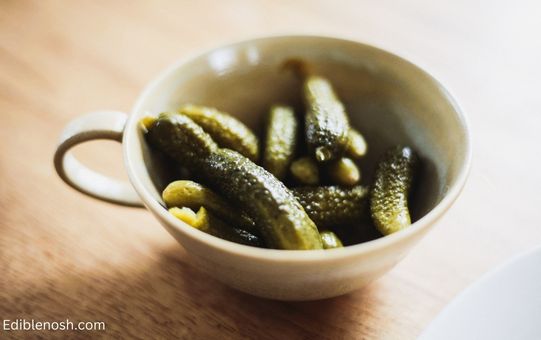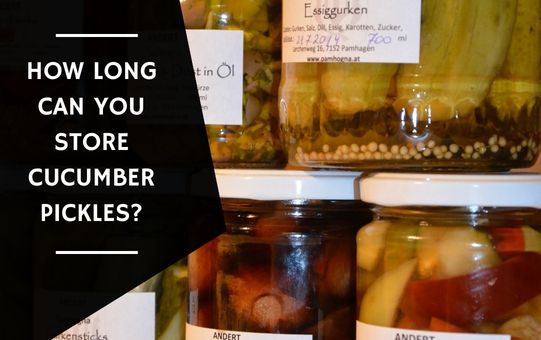Cucumber pickles are an amazing addition to any party menu. But how long can you store cucumber pickles? They’re crisp and refreshing, and they taste great with almost anything. But what happens when you forget to refrigerate them? Or maybe you forget to label them with the date?
Cucumber pickles stored in the refrigerator can last for up to 2 weeks, while canned pickles can last for several months to a year in a cool, dry place. Fermented pickles, or kosher dills, can last for several months to a year when stored in the fridge. Proper storage and using fresh, firm cucumbers can help extend the shelf life of pickles.
Let’s take a look at how long you can store cucumber pickles, in the following article.
Contents
How Long Do Cucumber Pickles Last?
The shelf life of cucumber pickles depends on a few factors, including how they were prepared and how they are stored. Here are some general guidelines to follow:
- Freshly made cucumber pickles that are stored in the refrigerator can last for up to 2 weeks. These pickles are typically made by soaking cucumbers in a mixture of vinegar, water, and spices, and then storing them in the fridge.
- Canned cucumber pickles can last for several months to a year when stored in a cool, dry place. These pickles are made by packing cucumbers into jars and then processing them in a hot water bath or pressure canner. The high heat used during the canning process helps to preserve the pickles and extend their shelf life.
- Fermented cucumber pickles, also known as “kosher dills,” can last for several months to a year when stored in the refrigerator. These pickles are made by placing cucumbers in a mixture of water, salt, and spices, and then allowing them to ferment for several weeks. The fermentation process helps to preserve the pickles and give them a tangy flavor.
Read Also: Are Cucumber Pickles Good For Health?
How to Pickle Overripe Cucumbers?
While it’s generally best to pickle cucumbers that are fresh and firm, you can still pickle overripe cucumbers by following these steps:
- Slice the cucumbers into rounds or spears, removing any soft or mushy parts.
- Soak the cucumber slices or spears in a mixture of water and salt for a few hours. This will help to draw out excess water and improve the texture.
- Rinse the cucumbers thoroughly with cold water and dry them with paper towels.
- In a saucepan, heat vinegar, sugar, and spices (such as dill, garlic, or mustard seeds) until the sugar dissolves.
- Pack the cucumbers into clean jars and pour the vinegar mixture over them, making sure to cover them completely.
- Seal the jars and store them in the refrigerator for at least a few days before enjoying.
Note that pickling overripe cucumbers may result in a softer texture and less crunch than pickling fresh cucumbers.
Can you pickle other vegetables this way?
Yes, you can pickle other vegetables using a similar process. Vegetables such as carrots, beets, onions, and green beans can all be pickled using a vinegar-based brine and spices.
The key is to choose vegetables that are fresh and firm, and to adjust the soaking and pickling times based on their size and texture. Experiment with different spices and flavorings to create unique pickled vegetables that you’ll enjoy.
How to Store Cucumber Pickles?
To get the most out of your cucumber pickles, it’s important to store them properly. Here are some tips to keep in mind:
- Freshly made cucumber pickles should be stored in the refrigerator. Be sure to keep them in an airtight container to prevent them from drying out or absorbing odors from other foods.
- Canned cucumber pickles should be stored in a cool, dry place. Avoid storing them in a damp basement or garage, as high humidity can cause the pickles to spoil faster.
- Fermented cucumber pickles should be stored in the refrigerator to slow down the fermentation process. Be sure to keep the pickles submerged in the brine to prevent them from drying out or developing mold.
Signs of Spoiled Pickles
It’s important to keep an eye out for signs that your cucumber pickles have gone bad. Here are some things to watch for:
- Mold: If you see any mold on the pickles or in the brine, it’s best to throw them out. Mold can spread quickly and may cause illness if ingested.
- Off odors: If the pickles have a bad smell or an “off” odor, it’s a sign that they have gone bad. Be sure to sniff the pickles before eating them, and discard any that have an unpleasant smell.
- Soft or mushy texture: If the pickles are soft or mushy, it’s a sign that they have started to spoil. This is especially true for fresh cucumber pickles that have been stored in the refrigerator for more than a week or two.

Tips for Extending the Shelf Life of Cucumber Pickles
If you want to make your cucumber pickles last as long as possible, here are a few tips to
try:
- Use fresh, firm cucumbers: When making cucumber pickles, it’s important to start with fresh, firm cucumbers. Avoid using cucumbers that are soft or have blemishes, as these can spoil faster.
- Use vinegar: The acidity of vinegar helps to preserve the pickles and extend their shelf life. When making fresh cucumber pickles, be sure to use vinegar as the base for the brine.
- Use sterilized jars and lids: When canning cucumber pickles, it’s important to use sterilized jars and lids to help prevent spoilage. To sterilize the jars and lids, you can boil them in water for 10 minutes, or run them through the dishwasher on a high-heat setting.
- Use a pressure canner: If you are canning cucumber pickles at home, it’s recommended to use a pressure canner rather than a hot water bath. The high heat and pressure of a pressure canner help to kill any bacteria and spores that may be present, which can help to extend the shelf life of the pickles.
- Keep the pickles submerged in the brine: When storing fermented cucumber pickles, it’s important to keep the pickles submerged in the brine to prevent them from drying out or developing mold. If the pickles are not completely covered by the brine, you can add a little more water or vinegar to ensure they are fully submerged.
Can You Freeze Cucumber Pickles?
Cucumber pickles can be frozen, but the texture may change once they are thawed. Fresh cucumber pickles that are made with vinegar and water may become soft and mushy when frozen, while fermented cucumber pickles may become sourer.
If you do decide to freeze your pickles, be sure to thaw them in the refrigerator before serving.
Read Also: Are cucumber pickles good for weight loss?
Conclusion
Cucumber pickles can be a tasty and refreshing snack, but it’s important to store them properly to ensure they stay fresh. Fresh cucumber pickles can last for up to 2 weeks in the refrigerator, while canned and fermented pickles can last for several months to a year when stored properly.
To extend the shelf life of your pickles, be sure to use fresh, firm cucumbers, sterilized jars, and lids, and keep the pickles submerged in the brine. You can also freeze cucumber pickles, but be aware that the texture may change once they are thawed.
FAQs | Can You Store Cucumber Pickles
Here are a few Faqs related to how long can you store cucumber pickles.:
How Long Do Canned Cucumber Pickles Last?
Canned cucumber pickles can last for several months to a year when stored in a cool, dry place.
How Long Do Fermented Cucumber Pickles Last?
Fermented cucumber pickles, or kosher dills, can last for several months to a year when stored in the refrigerator.
Can Cucumber Pickles Be Frozen?
Cucumber pickles can be frozen, but the texture may change once they are thawed. Fresh cucumber pickles may become soft and mushy, while fermented pickles may become sourer.
How Can I Extend The Shelf Life Of Cucumber Pickles?
To extend the shelf life of cucumber pickles, be sure to use fresh, firm cucumbers, sterilized jars, and lids, and keep the pickles submerged in the brine. You can also store them in the refrigerator or a cool, dry place, depending on the type of pickle.

